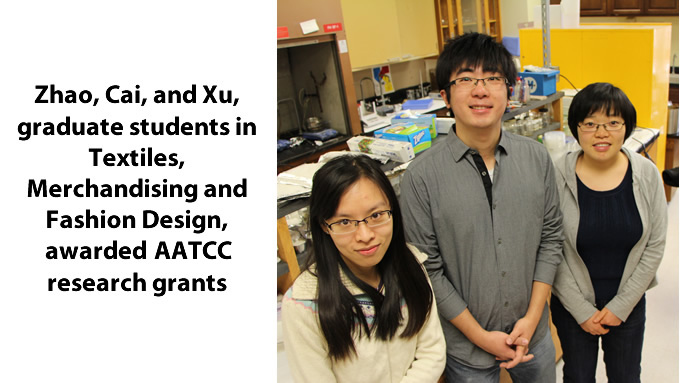
Zhao, Cai, and Xu awarded AATCC research grants
08 Jan 2013
Three textile science graduate students in the Department of Textiles, Merchandising and Fashion Design have won three of five student research awards in the national competition of the American Association of Textile Chemists and Colorists' Student Research Support Grants.
The students, mentored by Professors Yiqi Yang and Narendra Reddy, are: Shaobo Cai, AATCC Foundation Student Research Support Grant winner; Helan Xu, AATCC Foundation Student Research Support Grant winner; Yi Zhao, AATCC Foundation Student Research Support Grant winner.
Yi Zhao's research topic related to natural proteins or protein based materials to develop textile sizing, which help to improve the mechanical properties of yarns when weaving on machine. And the developed sizing is environmentally friendly. This line of research has broad application to traditional weaving processes and sizing technology. Her $900 grant supports her PhD research, entitled, “Study on Anti-felting of Wool Fabrics Treated with Keratin Nanoparticles/Enzyme,” PhD research 2012-2013, $900
Shaobo Cai is working on fabricating novel 3D electrospun scaffolds with controllable fiber orientations in three-dimensions for biomedical applications. He also is trying to utilize soyprotein and other water stable plant proteins to produce ultrafine fibers for biomedical, textile and many other industrial applications. His MS research received $1400 and is entitled, “Novel Electrospun Scaffolds with Fibers Oriented Randomly in Three Dimensions to Closely Mimic the Unique Architectures of Extracellular Matrix in Soft Tissues: Fabrication and Mechanism Study.”
Helan Xu is researching the fabrication of textile fibers and electrospun three dimensional structures from chicken feather, and development of nanoparticles from plant proteins and feather keratin. The fibers developed from chicken feather are meant to partially replace their petroleum based counterparts. Additionally, the three dimensional electrospun structures and protein nanoparticles could be used as drug delivery vehicles in biomedical applications. The nanoparticles could also be used for removal metal or textile dye in wastewater treatment. Her $1400 grant will support her PhD research topic, "Novel Regenerated Protein Fibers from Chicken Feather."
College of Education and Human Sciences
Textiles, Merchandising & Fashion Design